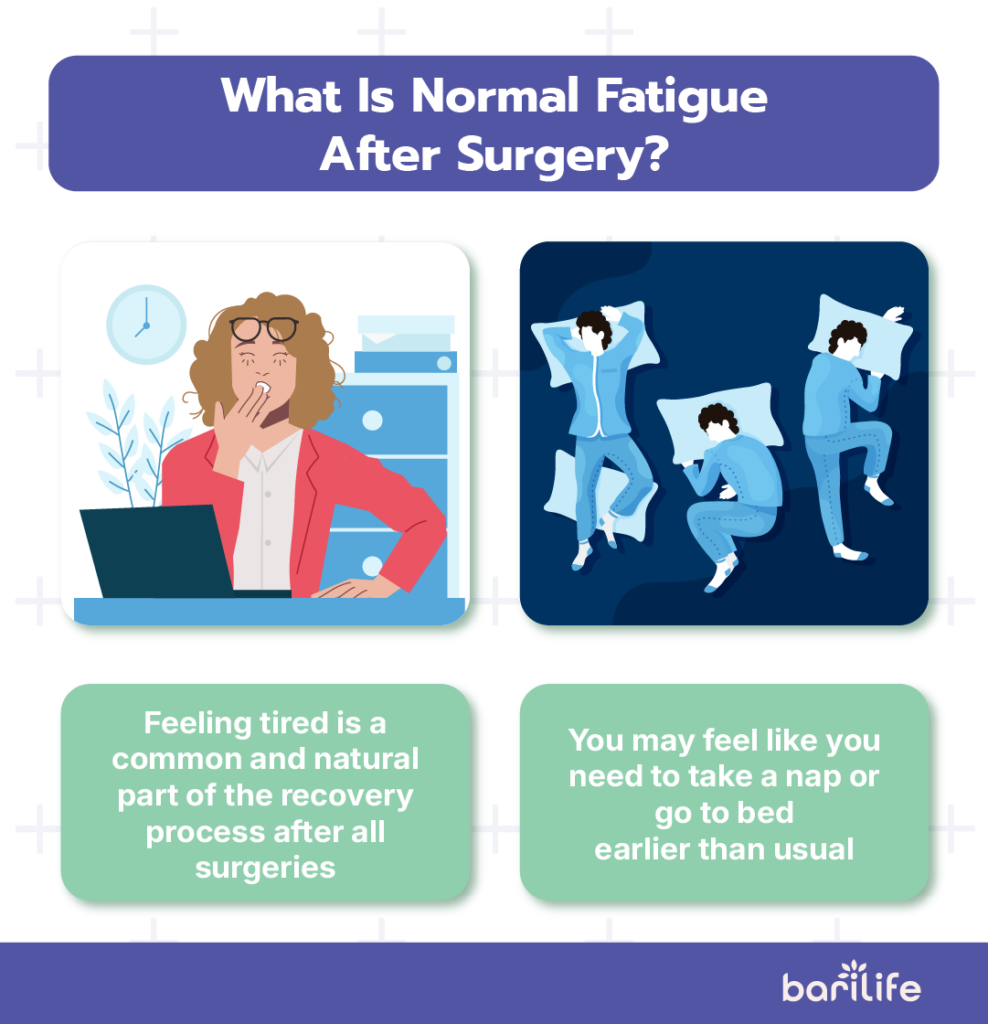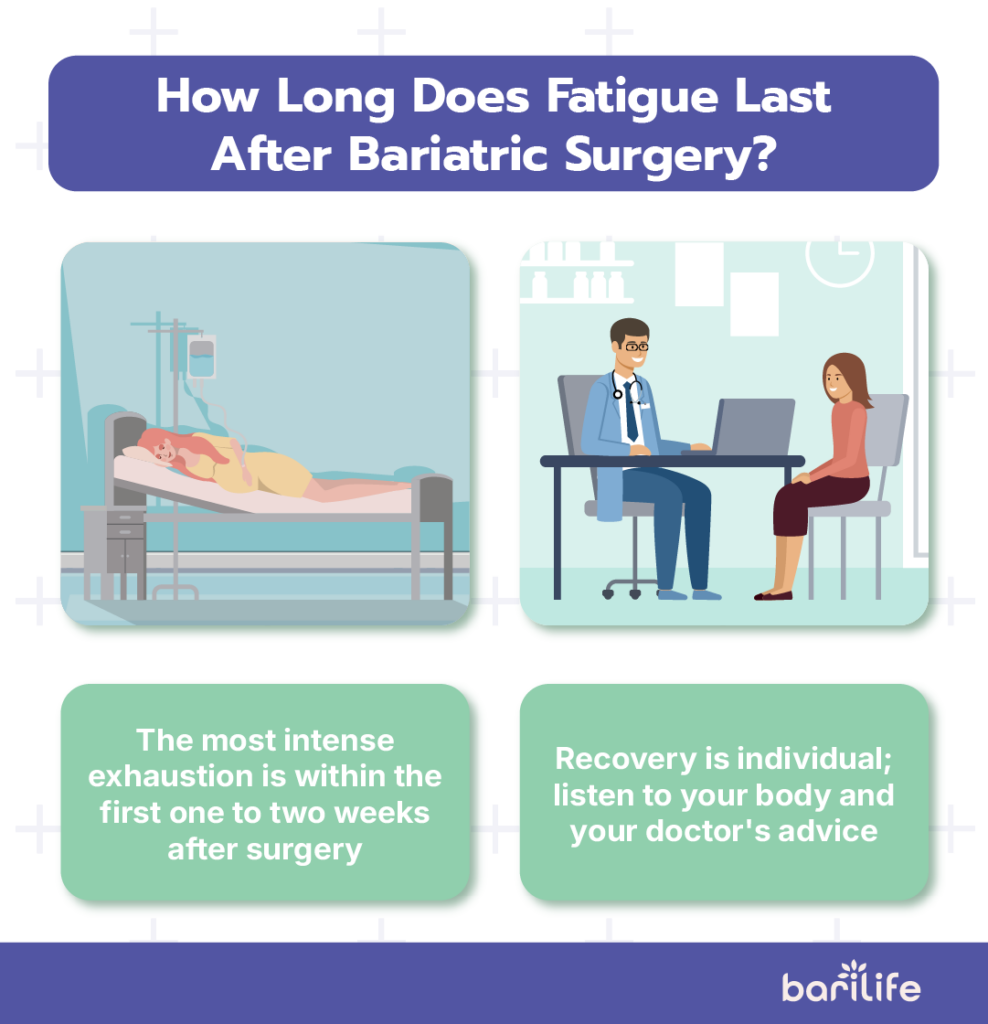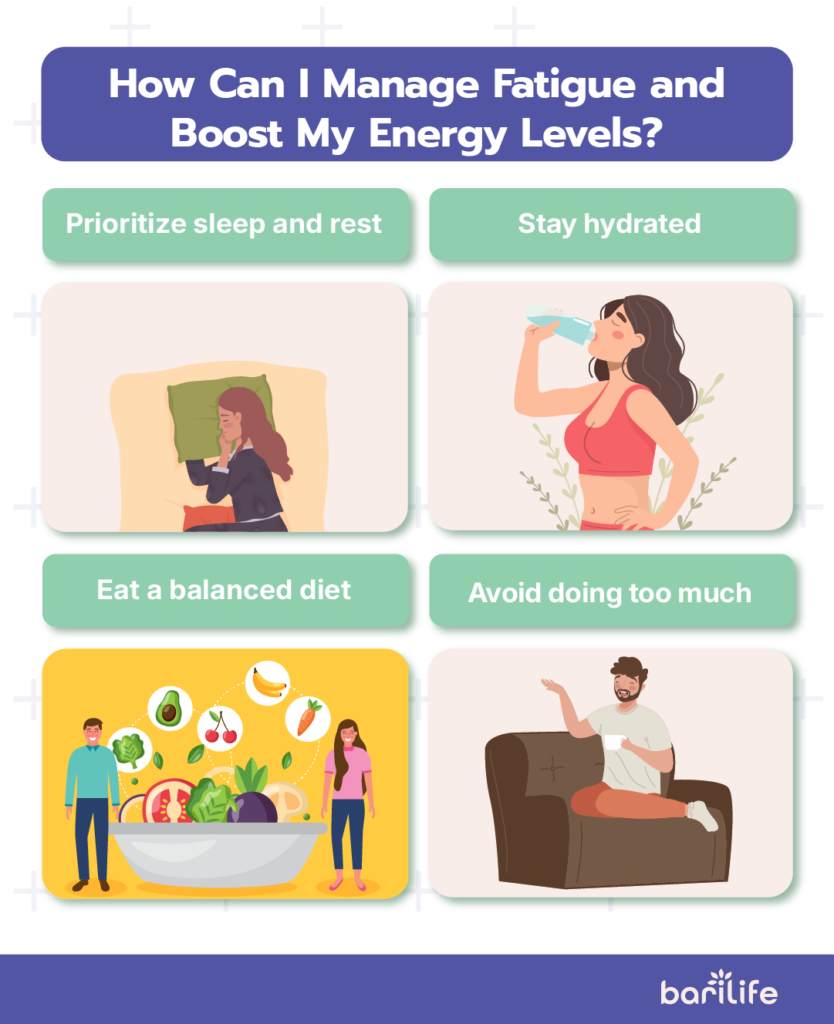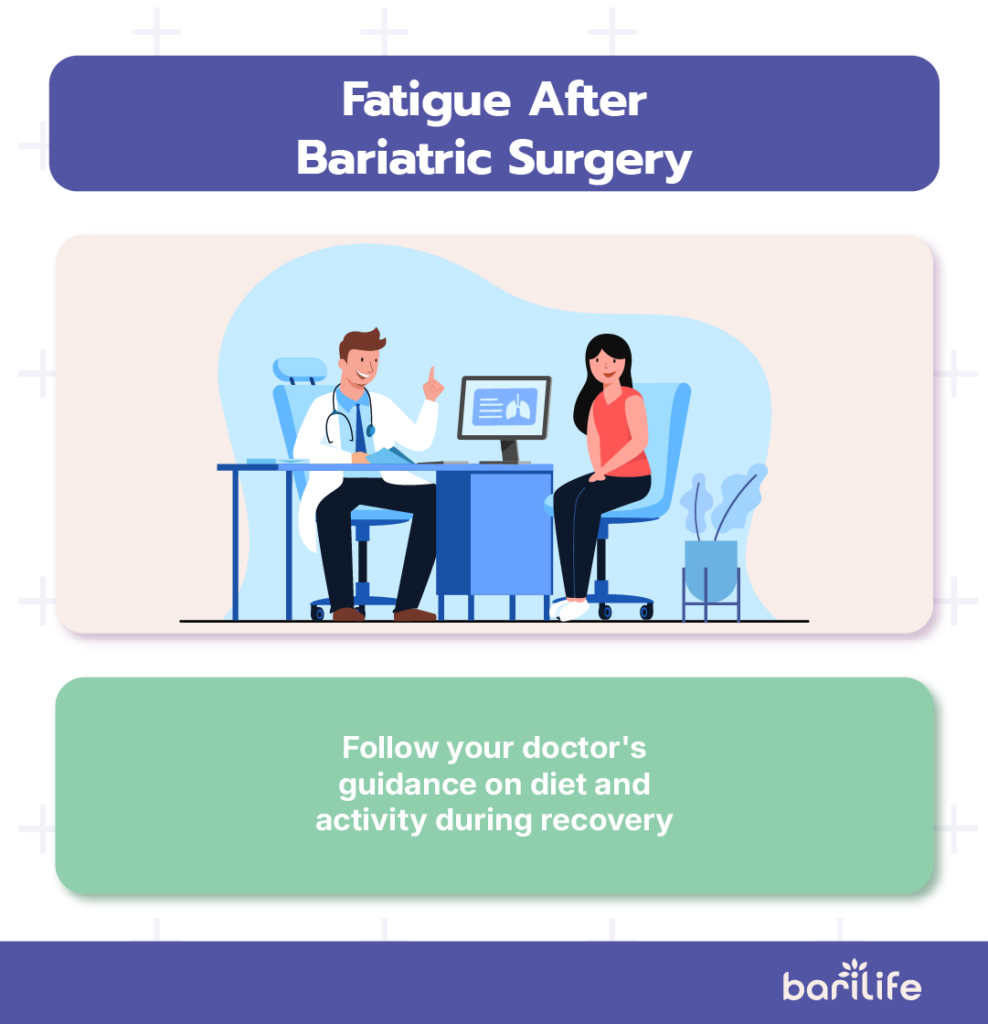Key Takeaways
- Feeling extra tired after bariatric surgery is common and can be related to the healing process, side effects of medications, and dietary changes.
- Prioritizing sleep and rest, eating a balanced diet, staying hydrated, and being physically active are several ways to feel more energized.
- If your tiredness persists or worsens, it’s best to notify your medical provider.
Feeling extra wiped out after surgery? Don’t worry. This is common and natural after bariatric surgery.
Your body is working overtime to adjust to the changes from the surgery. Your limited nutritional intake can also be part of why you are constantly yawning. Incorporating bariatric vitamins like bariatric multivitamins into your daily routine may help address any deficiencies contributing to fatigue.
Keep reading to learn why you are nodding off during the day and how you can support your body to gain more energy.
Table of Contents
What Is Normal Fatigue After Surgery?

Feeling tired is a common and natural part of the recovery process after all surgeries, including bariatric surgery. Your body is working hard to heal, adjust to changes, and regain strength. This is where bariatric snacks and bariatric protein bars can play a helpful role in maintaining your energy levels during recovery.
You may still need extra rest in the days and weeks following surgery.
During the day, you may feel like you need to take a nap or go to bed earlier than usual. You may also want to sleep in later. Feeling like this is your body’s way of telling you it needs time and rest to recover.
It’s also expected to have lower energy levels during the day. Tasks that were simple before surgery may feel more challenging.
Why Do I Feel Tired After Bariatric Surgery?
Your initial fatigue after surgery may be due to the effects of anesthesia and pain medications. These medications can make you feel quite tired.
Healing from surgery demands lots of energy from your body. While it may feel like you’re taking it easy, your body is actually working quite hard to heal. This can make you feel more sleepy than usual.
Another contributor to your fatigue is your lower calorie intake. Your body needs time to make adjustments to your new way of eating.
The changes to your digestive tract make it harder to absorb nutrients that boost energy, like iron, vitamin B12, and vitamin D.
Additionally, dehydration after bariatric surgery can exacerbate fatigue.
Dehydration is another factor that may make you feel exhausted after surgery. Your smaller stomach makes it hard to drink enough water. However, without enough water, your body can’t function properly.
How Long Does Fatigue Last After Bariatric Surgery?
How long fatigue lasts after bariatric surgery is different for everyone.
Typically, the most intense exhaustion is within the first one to two weeks after surgery as your body starts healing.

Over the next several weeks, you may gradually start to see your energy level improve. You may find it easier to return to light activities by this stage.
However, recovery is an individual process, and it’s important to listen to your body and your medical provider’s advice.
What Are the Signs That Fatigue Might Indicate a Problem?
While fatigue is a normal part of recovering from bariatric surgery, it’s important to recognize when it might be a sign of a more serious issue.
Persistent fatigue that doesn’t improve or gets worse over time could indicate a more serious issue.
If you experience other symptoms, such as shortness of breath, dizziness, heart palpitations, chest pain after bariatric surgery, or extreme weight loss, it’s important to seek immediate medical attention.
It’s also important to watch for signs of infection. If you notice fever, redness, swelling, or discharge from your surgical site, contact your medical provider right away.
If you experience pain after bariatric surgery that is severe, persistent, or accompanied by other symptoms, consult your medical provider promptly.
Can Nutrient Deficiencies or Dehydration Cause Fatigue?
Yes, both nutritional deficiencies and dehydration can cause fatigue after bariatric surgery.
Because bariatric surgery changes the way your digestive system processes food, it’s harder for your body to absorb vitamins and minerals.
Being deficient in iron, vitamin B12, and vitamin D are particularly common and can lead to anemia and other conditions that cause fatigue.
Dehydration is a frequent challenge. It’s harder to drink large amounts of water at once, making it a struggle to meet your body’s needs. However, your heart and other essential organs struggle to work properly without hydration.
How Can I Manage Fatigue and Boost My Energy Levels?
Managing fatigue requires letting your body have adequate rest and supporting the healing process.
- Prioritize sleep and rest: Create a regular sleep schedule that allows your body time to recover. This may mean going to bed earlier and sleeping in longer. Also, it’s good to take a nap during the day if your body needs it.

- Eat a balanced diet: Follow your medical provider’s advice and which foods to eat following your surgery. Eating nutrient-rich foods and avoiding foods that fill you up without providing nutrition is essential.
- Stay hydrated: Sip on water throughout the day to avoid overloading your digestive system. Choose water, clear broths, or sugar-free beverages and avoid carbonation.
- Gradually incorporate physical activity: Start with short walks and gradually increase to longer ones. Increase the intensity of your physical activity as your healing allows.
- Avoid doing too much: Take this time to focus on healing and ask for help when needed. Don’t overcommit to activities and responsibilities until your energy returns.
What Can I Do to Maintain Energy Levels Long-Term?
While feeling exhausted several weeks after surgery is natural, we know you want to get back to your normal energy level. Here are some tips to sustain energy for the long term.
- Prioritize follow-up care: Be sure to keep all your follow-up appointments to monitor your nutritional status and healing progress.
- Establish a regular exercise routine: Make exercise a regular part of your schedule. Choose activities you enjoy to stay motivated and gradually increase in intensity as your fitness level improves.
- Maintain a balanced diet: Stick to eating lean proteins, vegetables, fruits, whole grains, and healthy fats. These foods support your overall well-being and provide energy.
- Set realistic goals: Avoid doing too much too soon. Give yourself time to recover and get back to activities as your body and energy level allow.
Conclusion
You should expect to have very low energy levels right after bariatric surgery. You’ll probably want to sleep more as well. This is a normal part of the healing process. Listening to your body is good. Let yourself sleep longer at night and take a power nap during the day if needed.

Over several weeks, while your body continues to heal, your energy should improve. But don’t rush into too much too soon. Feed yourself nutrient-rich foods that support your energy, and prioritize light activities.
Follow up with your medical provider and follow their guidance on which foods to eat and what activities are safe to do while you heal.
If you want to learn more, why not check out these articles below:
- Hiccups after Bariatric Surgery
- Leg Cramps after Bariatric Surgery
- Tailbone Pain after Bariatric Surgery
- Shoulder Pain after Bariatric Surgery
- Left Side Pain after Bariatric Surgery
- Bruising after Bariatric Surgery
References
Hall GM, et al. (2002) Physiological and psychological influences on postoperative fatigue. Anesth Analg.
Tasdoven, I., & Balbaloglu, H. (2024). Impact of Laparoscopic Sleeve Gastrectomy on Fatigue in Obese Patients. Journal of Clinical Medicine.




What are your tips and tricks to post-bariatric success?